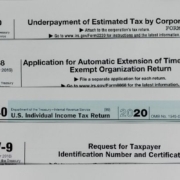When you expand your business into the US, what types of US corporations are there to choose from?
US Corporations
When your clients expand their business into the US, you will need one or two US corporations to optimise their US tax affairs. But what type of corporation?
That is the question Al Nunez of Andersen in San Francisco will discuss with you in this episode. Here is what we learned but please listen in as Al explains all this much better than we ever could.
To listen while you drive, walk or work, just access the episode through a free podcast app on your mobile phone.
US Corporations
For federal tax you have three types of US corporations – S-Corps, C-Corps and then LLCs.
S-Corps
S-corps are only suitable for US tax residents. Foreign residents can’t hold a share in an S-Corp. So if you are a resident of Australia and not the US, S-Corps are off the table.
LLCs
LLC stands for Limited Liability Corporation.
They are a state law concept, so it is really important that you choose a suitable state to create your LLC.
Under federal tax law LLCs are treated as a sole trader or partnership (depending on how many members you have) unless you make an election in time for the LLC to be treated as a corporation.
C-Corp
C-Corps are the closest thing to our Pty Ltd. You can use a C-Corp in combination with an LLC. You can set up your business directly in a C-Corp or just use the C-Corp as a blocker. make sure you create your C-Corp in a suitable state.
Where
Some states in the US are better than others when it comes to forming your LLC or C-Corp. You need to look for simplified corporate governance rules as well as low state taxes.
There are seven US states with simplified corporate governance rules – Nevada, Ohio, Washington, Texas, South Dakota, Wyoming and – the most popular of all – Delaware.
South Dakota and Wyoming impose neither a corporate income tax nor a gross receipts tax.
Nevada, Ohio, Washington, and Texas have no corporate income tax but charge a gross receipts tax.
Delaware imposes an income tax on businesses that operate there. But if you are merely incorporated in Delaware without any operations there, then no corporate income tax. However, the state receives a significant amount of revenue from the annual stock-based franchise tax imposed on corporations formed there.
MORE
US Individual Tax Return (Form 1040)
US v Australian Tax for Individuals
Disclaimer: Tax Talks does not provide financial or tax advice. All information on Tax Talks is of a general nature only and might no longer be up to date or correct. You should seek professional accredited tax and financial advice when considering whether the information is suitable to your or your client’s circumstances.
Last Updated on 04 March 2022







